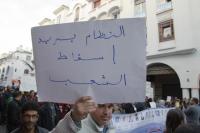 In Morocco, unlike other countries, despite the enormous popular support for the protests, which took place simultaneously in several cities on February 20, 2011, and that re-occurred sometimes on a weekly basis during that year, there were no calls (with some timid exceptions) based on the famous slogan “the people want the fall of the regime.” This would become a somewhat taboo slogan, either for fear of jeopardizing the monarchical regime, whose legitimacy is presented as being unquestionable, or by an apparently sincere devotion of a significant portion of the population towards the Moroccan monarchy. JSF#2
In Morocco, unlike other countries, despite the enormous popular support for the protests, which took place simultaneously in several cities on February 20, 2011, and that re-occurred sometimes on a weekly basis during that year, there were no calls (with some timid exceptions) based on the famous slogan “the people want the fall of the regime.” This would become a somewhat taboo slogan, either for fear of jeopardizing the monarchical regime, whose legitimacy is presented as being unquestionable, or by an apparently sincere devotion of a significant portion of the population towards the Moroccan monarchy. JSF#2
Games Without Borders
28.03.2016 | by Hugo Maia